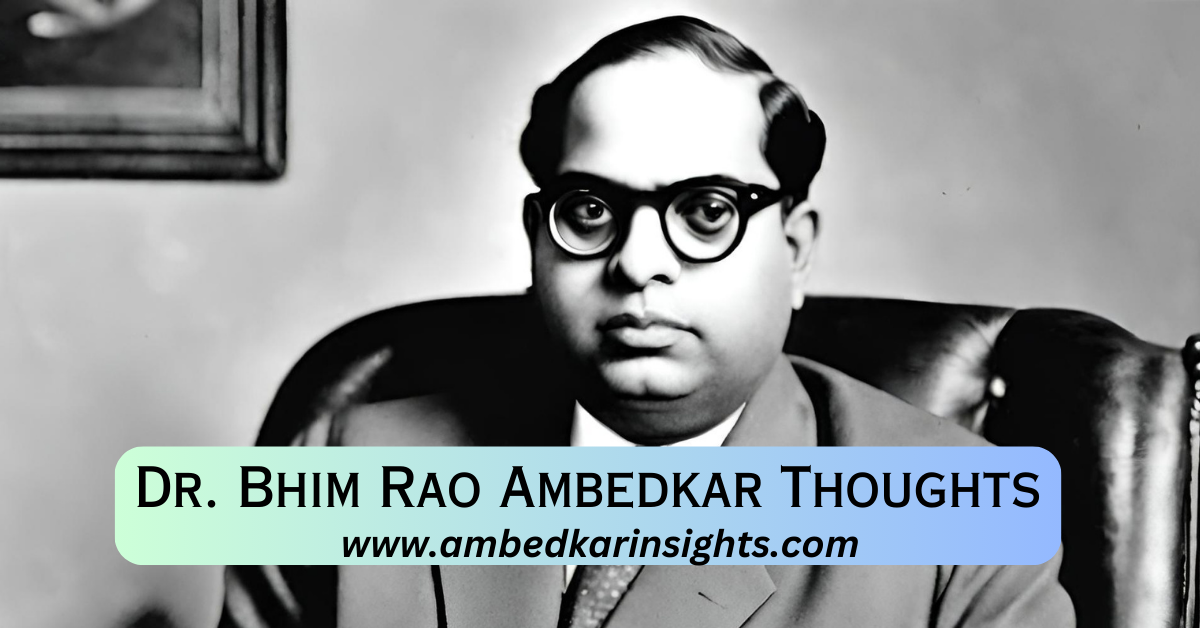|
Getting your Trinity Audio player ready...
|
Introduction:
Dr. Bhimrao Ramji Ambedkar, popularly known as Baba Saheb Ambedkar, was an eminent social reformer, jurist, and a key architect of the Indian Constitution. Born into a socially disadvantaged Dalit family on April 14, 1891 (Baba Saheb Jayanti), Dr. Ambedkar faced immense discrimination and adversity in his early years. However, through perseverance and intellectual brilliance, he rose to become a prominent leader, leaving an indelible mark on India’s social and political landscape. Dr. Ambedkar’s thoughts encompassed a wide range of issues relating to social inequality, untouchability, caste system, women’s rights, education, and the economic development of marginalized communities. This article explores some of his seminal ideas and their relevance in today’s world.
1. Baba Saheb for Equality and Social Justice:
Dr. Ambedkar firmly believed in the principles of equality and social justice. He advocated for the abolition of the caste system, which he viewed as a social evil that perpetuated discrimination and oppression. Ambedkar stressed the need for untouchables, or Dalits, to assert their dignity and fight for their rights. His efforts led to the inclusion of provisions in the Indian Constitution that outlawed untouchability and provided affirmative action measures, known as reservations, for the upliftment of Dalits and other marginalized groups. Ambedkar’s thoughts on equality and social justice continue to inspire movements for emancipation and inclusion worldwide.
2. Education and Empowerment:
Another crucial aspect of Dr. Ambedkar’s thoughts (Baba Saheb) was education and its role in empowering individuals and communities. Ambedkar understood that education was the key to breaking the cycle of intergenerational poverty and discrimination. He emphasized the importance of education for Dalits and women, advocating for access to quality education as a fundamental right. Ambedkar himself pursued higher education in the face of immense challenges, earning multiple degrees and becoming the first Dalit to obtain a doctorate. He believed in the transformative power of education in nurturing critical thinking, self-confidence, and the ability to challenge the status quo.
3. Women’s Rights:
Dr. Ambedkar was a staunch advocate for women’s rights and gender equality. He recognized that gender-based discrimination was deeply entrenched in Indian society and called for the upliftment of women. Ambedkar fought against regressive social practices like child marriage and advocated for equal rights for women in inheritance, property ownership, and marriage. He played a pivotal role in pushing for the Hindu Code Bill, which sought to provide greater legal protection and rights for Hindu women. Ambedkar’s thoughts on women’s rights continue to inspire the ongoing struggle for gender equality in India and beyond.
4. Economic Justice and Empowerment:
Ambedkar believed that economic empowerment was crucial for social and political empowerment. He emphasized the need for economic justice and equal distribution of resources. Ambedkar viewed poverty as a form of social oppression and called for economic reforms to uplift marginalized communities. He championed land reforms, access to credit, and employment opportunities for the underprivileged. Ambedkar’s ideas on economic justice laid the foundation for a more inclusive and equitable society, with policies such as reservations in public employment and educational institutions being instrumental in providing opportunities for marginalized communities.
5. Annihilation of Caste:
One of Dr. Ambedkar’s (Baba Saheb) most influential works is “Annihilation of Caste.” In this seminal text, Ambedkar highlighted the inherent injustices of the caste system and its detrimental impact on society. He passionately argued for the complete eradication of caste divisions and the establishment of a society based on equality and fraternity. Ambedkar called for a radical reconstitution of Indian society and the promotion of a more inclusive social order, free from caste-based discrimination. His thoughts on the annihilation of caste continue to inspire debates and movements challenging caste supremacy in India.
6. Democracy and Political Participation:
Dr. Ambedkar strongly believed in the power of democracy as a means to ensure social justice and equal representation. He recognized the importance of political participation for marginalized communities and fought tirelessly to secure their rights. As the chairman of the drafting committee of the Indian Constitution, Ambedkar played a pivotal role in shaping India’s democratic framework, ensuring that it safeguarded the interests of all citizens, regardless of their social background. He advocated for universal suffrage, reservation of seats for marginalized groups, and the right to political representation. Ambedkar’s thoughts on democracy and political participation continue to inspire efforts to enhance the inclusiveness and effectiveness of democratic systems worldwide.
7. Secularism and Religious Freedom:
Ambedkar was a staunch advocate of secularism and the separation of religion and politics. He recognized that religious divisions and fanaticism were major obstacles to the achievement of social justice and equality. Ambedkar firmly believed in the principle of religious freedom and sought to safeguard this fundamental right in the Indian Constitution. He argued that the state should not favor or discriminate against any religion, ensuring that all citizens had the freedom to practice and propagate their faith without fear of persecution. Ambedkar’s thoughts on secularism remain highly relevant today as societies grapple with religious tensions and the need to protect individual freedoms.
8. Human Rights and Social Reforms:
Dr. Ambedkar (Baba Saheb) was known for his staunch commitment to human rights and his struggle against social injustices. He believed that every individual, regardless of caste, creed, or gender, deserved dignity and respect. Ambedkar advocated for laws and policies that would protect human rights and uphold individual freedoms. He fought against social evils such as child marriage, gender-based violence, and untouchability. Ambedkar’s thoughts on human rights continue to serve as a guiding light for social reforms, inspiring movements that strive to eradicate discrimination and create a more inclusive society.
9. International Perspective:
Dr. Ambedkar’s thoughts (Baba Saheb) extended beyond the borders of India. He was well aware of the global nature of social inequalities and drew inspiration from international movements for justice and equality. Ambedkar actively engaged with international forums and advocated for the rights of marginalized communities on the global stage. His thoughts resonated with struggles for civil rights, anti-colonial movements, and movements for social justice worldwide. Ambedkar’s ideas continue to provide insights and inspiration for the struggle against discrimination and prejudice on a global scale.
10. Continuing Relevance and Challenges:
Despite significant progress in the pursuit of equality and social justice, Dr. Ambedkar’s thoughts and teachings continue to be relevant in today’s world, as numerous challenges persist. Caste-based discrimination, though officially outlawed, continues to be deeply ingrained in Indian society, resulting in systemic inequalities and social exclusion. The struggle for equal opportunities and representation for marginalized communities remains ongoing. Efforts are needed to address issues such as economic disparities, educational access, and political empowerment to fulfill Ambedkar’s vision.
Ambedkar’s ideas (Baba Saheb Thoughts)also remain crucial in the context of gender equality. While strides have been made, gender-based discrimination and violence persist globally. Women’s rights continue to be a pressing issue, and Ambedkar’s advocacy for gender equality serves as a reminder of the work that needs to be done to ensure equal opportunities and protection for women.
The concepts of secularism and religious freedom espoused by Ambedkar are particularly relevant in today’s diverse and multicultural societies. The challenge lies in fostering an environment where individuals can freely practice their faith while building mutual respect and understanding among different religious communities.
Ambedkar’s emphasis on education and economic empowerment as catalysts for social transformation remains pertinent. Inequalities in access to quality education and economic opportunities persist, hindering the advancement of marginalized communities. Policies and initiatives that promote inclusive education, skill development, and equitable economic systems are essential to realizing Ambedkar’s vision.
Furthermore, Ambedkar’s thoughts on human rights and social reforms serve as a constant reminder of the need to uphold the dignity and rights of all individuals. Efforts to eradicate discrimination, violence, and social evils must be continued, creating a society that respects and protects the inherent worth of every person.
11. Inspiration for Change:
Dr. B. R. Ambedkar’s thoughts (Baba Saheb Thoughts) serve as a guiding force for those struggling against social injustices and discrimination. His revolutionary ideas have inspired numerous social movements, organizations, and individuals who are dedicated to combating inequality and shaping a more just and inclusive society. The ideals he championed continue to motivate people to challenge oppressive systems and work towards collective upliftment.
Ambedkar’s teachings also offer valuable lessons in leadership, perseverance, and the power of education. His own journey from a disadvantaged background to becoming an influential intellectual and reformer demonstrates the transformative potential of education and the determination to fight for one’s rights.
Moreover, Ambedkar’s international perspective reminds us that social justice is a global cause, transcending borders. His ideas find resonance in struggles against various forms of discrimination and marginalization worldwide, bolstering the collective efforts towards a more equitable and compassionate world.
12. the necessity of constant struggle and collective action:
One additional important thought of Dr. B. R. Ambedkar is the necessity of constant struggle and collective action for social change. Dr. Ambedkar understood that achieving true equality and social justice requires active participation, perseverance, and solidarity among marginalized communities and their allies. He believed that change cannot be bestowed upon the oppressed by the oppressors; it must be fought for and demanded. Dr. Ambedkar emphasized the need for organized movements, collective mobilization, and the power of unity to challenge the status quo and dismantle oppressive structures. His thoughts remind us that true progress can only be achieved through the relentless struggle for justice, standing together against oppression, and working towards a society where every individual enjoys equal rights and respect.
Conclusion:
Dr. B. R. Ambedkar’s thoughts and philosophy continue to inspire generations in their pursuit of a more egalitarian and inclusive society. His ideas on equality, social justice, education, women’s rights, democracy, secularism, human rights, and international solidarity have left an indelible mark on social and political discourse. To honour his legacy, it is essential to actively engage with his thoughts, address the challenges that persist, and work towards building a society that upholds the principles he espoused—a society where every individual, regardless of caste, gender, or background, has equal rights, opportunities, and dignity. In doing so, we can collectively contribute to the realization of Dr. Ambedkar’s vision of a just and equitable world.
Dr. Ambedkar’s teachings remind us that social transformation requires a constant pursuit of justice and equality. We must strive to dismantle discriminatory systems and be champions of inclusion, recognizing that the journey is long and multifaceted. The relevance of his thoughts extends beyond the boundaries of India, inspiring movements for social change globally. As we navigate the challenges of the modern world, Dr. Ambedkar’s legacy calls upon us to confront the deep-rooted inequalities that persist and work towards building a society where everyone has equal opportunities and where social identities cease to determine one’s destiny. By embracing his thoughts, we join a larger movement for a more just and humane world—a world that upholds the principles of human dignity, social justice, and equality that Dr. Ambedkar tirelessly fought for throughout his life.
If you enjoyed this article, please leave a comment below. For more content like this or any suggestions, reach out to us using the contact form provided below or send us an email.



